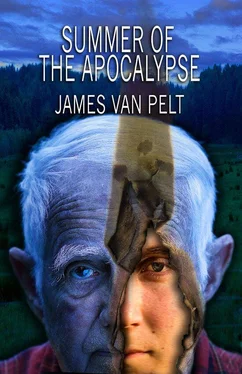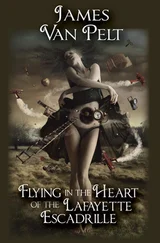The next day, after another nine hours of driving, and after crossing the Mexican border, they pulled to the side of the road. Dad kept checking his watch. Puzzled, Eric climbed out of the car and sat next to his dad on the hood. Up and down the two-lane highway, Eric could see other cars parked like theirs. Some people had telescopes, and others held up sheets of paper or cardboard and let the sun’s tiny image fall through a pinhole onto another sheet of paper. Dad had a similar contraption and showed Eric the circle of light no bigger than a pea.
“It’s starting,” Dad said, almost in a whisper. Eric looked at the paper, but nothing seemed different. He glanced up.
“Don’t,” said Dad, startling Eric. “You can’t look at some things straight on.” He pulled Eric around and held onto his shoulder. “Here,” he said.
Eric looked at the pea-sized light again, but now he saw a tiny notch taken out of one side. Under his dad’s heavy hand, Eric squirmed uncomfortably. Why have we stopped out here? he thought. What’s the big deal? He wanted to climb back into the car and read a comic. Then a horrible realization came to him: this is it. This is why we’ve come so far. This is a total eclipse of the sun. Choked with disappointment, he looked at the image, and slowly, ever so slowly, the notch grew bigger.
“I don’t want…” began Eric.
“Shush!” said Dad and tightened his grip. Over half the sun’s image had vanished, like a dark coin sliding across a bright one.
Eric looked up, and he blinked. Everything seemed shadowy, and the after-image of the partially eclipsed sun kept crossing his vision. He tried to blink it away. A happy buzz of talk from a group of people standing by a car fifty yards up the road caught Eric’s ear. They too stared at the sun’s image. One of them, wearing sunglasses, stood apart looking directly into the sky.
Then, gradually, the air dimmed more and chilled. In the mutated light, the land looked alien. Even with other people in sight, Eric felt isolated, like he and his dad were lone explorers in a new world. Birds he hadn’t really noticed before quit chirping. Without knowing why, Eric began crying. Now, in Littleton, clouds covering the sun, the houses and lawns almost purple in the odd light, Eric felt like he was once again at the eclipse. Dad hadn’t explained to him what had happened until they were driving home. He’d assumed Eric knew what an eclipse was. For the weeks before, he’d thought Eric was excited as he was about the chance to see one. “It was a once-in-a-lifetime opportunity,” he said repeatedly.
Leda twisted the garage door handle, but the door wouldn’t budge. “Dang,” she shouted. Her vehemence startled him. The wind pushed her hair in front of her face, and the bitter smoke caught in Eric’s throat. He coughed hard, once, and squinted his eyes against it, then rubbed goose-bumps off his arms. This is weird, he thought. Wind’s cold, like winter cold, but the smoke smells hot. Leda said, “You going to help, or what?”
“How about that window?” he said. A clean, pink and blue geometric patterned drape hid whatever was in the garage. He pried a decorative border-brick out of the garden and heaved it through the glass without a qualm Careful of the glass he looked in. It was hard to imagine that they were actually breaking into someone’s house. Not only did he feel that in some way no one owned this house anymore, but that the whole city was unowned. Even though two tricycles were entangled by the back door, that a tennis racket, three baseball bats and a fishing pole stuck out of a cardboard barrel by a work bench, and that a sign above the cluttered bench read, “BLESS THIS MESS,” he couldn’t imagine the people they belonged to. He felt like an explorer as he had with his dad, like a Conquistador. Absurdly, for an instant, he thought about “claiming” the house, but he couldn’t come up with a sovereign to claim it for, and he decided Leda might think it stupid. She was clearly agitated.
“Help me up,” said Leda.
Eric stepped between her and the window. “You’ll cut yourself.” He tugged sharp-edged glass teeth out of the frame. Leda stared to the west, where the sky grew increasingly dark.
“Hurry,” she said. “We need to find a ladder.”
Eric shook his head without understanding and removed the last piece of glass. “Okay.” Once inside, Leda yanked the manual release on the garage door opener and slid the door up its tracks, but the outside wasn’t that much lighter than the leaden interior. Eric spotted a ten-foot extension ladder hanging from a pair of hooks. He took one end while Leda carried the other, and they set it against the side of the house. Leda swarmed up before Eric was even sure the ladder was firmly planted. He rattled the ladder, then followed her.
Leda, bracing her tennis shoes against the siding, leaving a pair of smudges, chinned herself from the low garage roof to the higher roof above the second story. Running lightly, Eric jumped and caught the edge of the roof on his chest, easily levering himself up beside her.
“It’s an advantage to be tall,” he said, but she was peering west and didn’t seem to hear him, or the clamor of wind might have swallowed his words.
“That’s what I thought,” she shouted.
“What?”
Eric looked back the why they’d come. Through the smoke at first he noticed the clouds, now directly overhead, blackening the sky and hiding the mountains, They’d lost their shapes, and become a single, sullen, flat gray, plate-seeming to rest only a hundred feet above and stretching north, south and west. To the east, a thin line of blue vanished as he watched.
“Not there,” Leda said. “There.” She pointed to where the road crested over a hill they’d come over a mile or so away. Smoke obscured his vision, then the distance cleared and he could see the intervening ground: closest to them, hundreds of house roofs poked through a broad expanse of trees bending in the wind. Beyond that, closely packed stores and warehouses crowded Bowles Avenue. Open field, golden with waist-high, dry prairie grass stretched both north and south behind the business areas. He saw nothing odd.
“Check the horizon,” Leda said. Her hand traced the shape of the hill, and she waved to show the clouds above.
More smoke blew in their faces, and Eric turned away until it lessened. He wiped his eyes and studied the empty reach of road. A flicker of movement caught his attention. It was a black dog, maybe a Labrador Retriever, racing down the street. A few blocks farther, he spotted another pair of indeterminate breed, running their direction like greyhounds. He thought, what are they running from? and he looked at the clouds again. On the horizon, outlining the hill and the line of building and fields on either side, the cloud’s color was different. Not the flat gray like that above them, but a seething, dark, dark red.
He started to ask, “What is that?” but he knew. A bright line of flame crested one side of the hill. Pushed by the wind, it flowed through the grass like water and washed against the backside of one of the mini-malls. A flash of light and flame enveloped the building, and a few seconds later, the dull whump of the explosion reached them. Flame broke over the top and the other side of the hill simultaneously. As far as he could see, in both directions, fire flew along the ground toward them.
“We’ve got to find a safe place!” yelled Leda. She hopped onto the garage roof, lost her footing on the pitch and almost slid off the edge before catching herself.
Eric leaned into the gale, which was really brutal now, and watched the flames for another instant. Wind flattened it out. It didn’t look like a campfire, but like a blow-torch, nearly horizontal. A building in the path caught fire before the flame reached it. He realized the air in front must be super-heated. Nothing could stand up to it for long. He hopped down, careful not to fall, and followed Leda down the ladder to the ground.
Читать дальше












